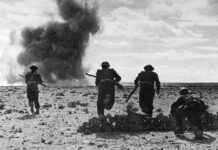Between human activity and climatic upheaval, the agony of the river threatens to carry away the life that settled there thousands of years ago.
In this country of 42 million inhabitants, at the source of civilization and agriculture, natural disasters are countless.
From April, temperatures exceed 35 degrees Celsius and sandstorms follow one another, covering humans, animals and machines with an orange film.
Comes summer, the season in hell for Iraqis who only have their skin to sweat when the weather forecast announces 50 degrees and the electricity is cut off due to load shedding.
Droughts, falling rainfall, rising temperatures and galloping desertification: Iraq has become one of the five countries in the world most exposed to the consequences of climate change, says the United Nations.
And the Tiger? He no longer roars. Due to the lack of rain but also to the dams built upstream, in Turkey, where it originates.
An AFP videographer surveyed the banks of the river, from the source in the north to the sea in the south, to report on the disaster which forced the inhabitants to change their way of life.
– Fichkhabour (north): With the dam, “day by day the water is decreasing” –
The Iraqi journey of the Tigris begins in the mountains of Kurdistan at the crossroads of Iraq, Syria and Turkey. Here, we earn our living by growing potatoes and raising sheep.
In Fichkhabour, “our life depends on the Tiger”, explains Pibo Hassan Dolmassa, 41, straight in his dusty sarouel. “All our work, our agriculture, depends on it.”
But “for two or three years”, it does not go any more. “Day by day, the water is decreasing,” he notes, while “before, the water was pouring out in torrents”.
Iraqi authorities and Kurdish farmers accuse Turkey of withholding water from dams built upstream.
Official statistics confirm this: the level of the Tigris, when it arrives from Turkey, this year is only 35% of the average quantity that flowed into Iraq over the past 100 years.
The more the water is retained, the more its flow is reduced and the less it flows into Iraq, along the 1,500 km that the Tigris travels before merging with its twin, the Euphrates, to form the Shatt al-Arab and fall into the Gulf.
The case is a source of friction.
Baghdad regularly asks Ankara to release more water. In return, the Turkish ambassador to Iraq, Ali Riza Güney, called on the Iraqis in July to “use the available water more efficiently”. “Water is widely wasted in Iraq,” he added in a tweet.
The experts themselves speak of insane methods: as in the time of the Sumerians, Iraqi farmers continue to flood their fields to irrigate them, leading to enormous water losses.
– Diyala (center): “We are going to be displaced because of the water” –
In places, it looks like puddles of rainwater.
But the small accumulations of water in the bed of the Diyala River are all that remains of this confluence of the Tigris in central Iraq, without which no cultivation is possible in the province of the same name.
This year, due to the drought, the authorities have halved the cultivated areas across the country. And as in Diyala there is not enough water, Diyala will not cultivate.
“We will be forced to abandon agriculture and sell our animals,” says Abou Mehdi, a 42-year-old farmer with a jet mustache and a white djellaba.
“We were displaced by the war ‘against Iran in the 1980s’ and now we are going to be displaced by water. Without water, we absolutely cannot live in these areas,” he says.
The man tried to find some on his own. “We sold everything, we got into debt to dig a well. I dug a 30-meter well, it was a failure.”
By 2050, “a temperature rise of one degree Celsius and a drop in precipitation of 10% would cause a 20% drop in available fresh water” in Iraq, warned the World Bank at the end of 2021. a third of the irrigated land will then have no water.
Water scarcity, challenges to sustainable agriculture and food security are among “the main drivers of rural migration to urban areas” in Iraq, warned the UN and several NGOs in June.
By the end of March 2022, more than 3,300 families had been displaced by “climatic factors” in ten central and southern provinces, according to a report published in August by the International Organization for Migration (IOM).
“Climate migration is already a reality in Iraq,” said the IOM.
– Baghdad: “Sand deposits” and waste in the river bed –
This summer, in Baghdad, the level of the Tigris was so low that AFP filmed young people playing volleyball in the middle of the river. The water barely reached their waists.
It is the fault of “sandy deposits”, explains the Ministry of Water Resources.
No longer carried to the south due to lack of flow, these deposits have accumulated at the bottom of the Tigris and the river, where the inhabitants of the capital discharge their waste water, has the greatest difficulty in flowing.
Until recently, the government sent machines to suck up the sand that settles on the bed of the river, but, due to a lack of resources, the pumps are now idling.
Awareness of environmental issues by the government and the population is “low” even if “every Iraqi feels the climate change which is reflected in rising temperatures, lower rainfall, lower water levels, dust storms,” says environmental activist Hajer Hadi.
With her NGO Climat vert, the young woman surveys schools and universities to awaken young people to ecology and the effects of climate change on their country.
A necessity, as the Iraqi government, which must manage a political and economic crisis after years of war, is not very present in this field.
– Ras al-Bicha (south): salty soils, “thirsty palm trees” –
“Do you see these palm trees? They are thirsty,” says Molla al-Rached, pointing to a dozen palm trees. “They need water. I’m going to irrigate them glass by glass? By the bottle?” despairs the 65-year-old farmer.
Ditto in the nearby palm grove where you can only see the skeletons of decapitated trees.
“There is no fresh water, life is over,” says the man, beige keffiyeh on his head.
Ras al-Bisha is on the borders of Iraq, Iran and Kuwait, where the Shatt al-Arab, the main channel of the delta common to the Tigris and the Euphrates, flows into the Gulf.
With the drop in the level of fresh water, the waters of the sea engulf and rise in the Shatt al-Arab.
The UN and farmers point to the impact of water salinization on soils and its repercussions on agriculture and yields.
To water her animals, Molla al-Rached must buy fresh water from tank trucks.
Even wild animals, he says, venture into homes in search of a few drops.
“My government doesn’t provide me with water,” he says. But, he continues, distraught, “I want water, I want to live. I want to plant, like my ancestors.”
– Shatt al-Arab (far south): seawater drives out freshwater fish –
Flooded by the rosy light of dusk, barefoot on his boat that he pushes with the help of a stick like a Venetian gondolier, Naïm Haddad returns from a day of fishing on the Shatt al-Arab.
On the outskirts of Basra, the southern metropolis, Naïm shows off a bag full of fish.
“From father to son, we dedicate our lives to fishing,” says the forty-year-old with a salt-and-pepper beard. Fish — “samatche”, as the Iraqis call it — is her only livelihood to support her family of eight. “No government salary, no allowances,” he says.
But salinization is wreaking havoc on him too. “In summer, we have salt water, sea water rises and reaches here,” he explains.
In early August, the salinity level in Shatt al-Arab north of Basra was 6,800 parts per million (ppm), local authorities said. In principle, fresh water does not exceed 1,000 ppm, according to the standards of the American Institute of Geophysics, fixing the level of “moderately salty” water between 3,000 and 10,000 ppm.
Consequence: some species of freshwater fish very popular with fishermen, such as carp, desert the Shatt al-Arab.
They are replaced by other species normally evolving in the high seas.
“If the water (fresh, editor’s note) decreases, the fishing decreases and our livelihood decreases”, deplores Mr. Haddad.
He cannot convert to fishing on the high seas, his boat cannot face the waters of the Gulf. Above all, he has seen enough fishermen being arrested by the Iranians and the Kuwaitis arguing that they had illegally crossed their maritime borders.








